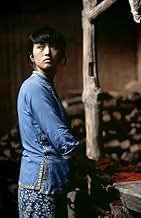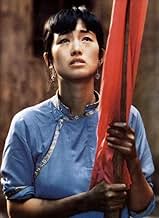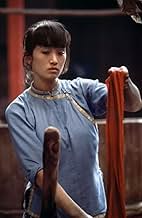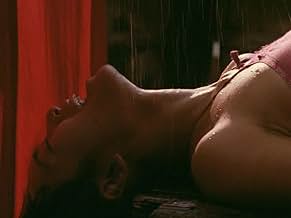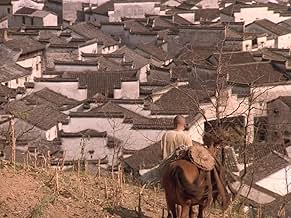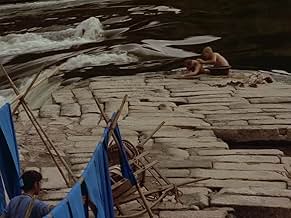PUNTUACIÓN EN IMDb
7,6/10
9,4 mil
TU PUNTUACIÓN
Añade un argumento en tu idiomaIn rural China, the young bride of a tyrannical owner of a silk-dyeing business finds temporary solace in the arms of her husband's nephew, but problems arise when she becomes pregnant.In rural China, the young bride of a tyrannical owner of a silk-dyeing business finds temporary solace in the arms of her husband's nephew, but problems arise when she becomes pregnant.In rural China, the young bride of a tyrannical owner of a silk-dyeing business finds temporary solace in the arms of her husband's nephew, but problems arise when she becomes pregnant.
- Nominado para 1 premio Óscar
- 8 premios y 6 nominaciones en total
Reseñas destacadas
Gong Li is just about one of the most beautiful actresses in the world today. It is hard to believe that she has been acting for 20 years.
This is one of her earlier works, and it is an excellent example of her talent. It is also one of the early films for Yimou Zhang, who also directed Gong Li in Curse of the Golden Flower. He shows the promise of a great director in this film.
There is not much that is pleasant her. Ju Dou (Gong Li) is bought by an evil man who has beaten two wives to death for not bearing him a son. She is beaten mercilessly and he has constant sex with her to have a son.
The problem is not his wives, but him, and she has a son secretly with his nephew (Baotian Li). It saves her life, but matters continue to get more and more complicated until the final tragedy.
One of the really interesting features of the film is the Chinese funeral ritual.
The film is a great example of the early work of two great talents, but do not think that early means weak, as they were bother strong from the beginning.
This is one of her earlier works, and it is an excellent example of her talent. It is also one of the early films for Yimou Zhang, who also directed Gong Li in Curse of the Golden Flower. He shows the promise of a great director in this film.
There is not much that is pleasant her. Ju Dou (Gong Li) is bought by an evil man who has beaten two wives to death for not bearing him a son. She is beaten mercilessly and he has constant sex with her to have a son.
The problem is not his wives, but him, and she has a son secretly with his nephew (Baotian Li). It saves her life, but matters continue to get more and more complicated until the final tragedy.
One of the really interesting features of the film is the Chinese funeral ritual.
The film is a great example of the early work of two great talents, but do not think that early means weak, as they were bother strong from the beginning.
Mesmerizing melodrama set in 1920's China about a young woman who is forced to wed an abusive dye mill owner, who tortures her like an animal for not giving him a son, but more importantly, an heir. She decides to indulge in an affair with the nephew of her husband. Enthralling study of passion, sensation and burning for revenge brought to life in an extraordinary fashion which earned the film an Oscar nomination for the Best Foreign Language Film of 1990.
Ju Dou was censored and banned in China because it was considered politically dangerous by portraying the lead female character as rebelling against the male in authority. After it was promptly banned, it was resurrected and made available for Western Hemisphere audiences via the official protests of directors like Woody Allen, Martin Scorsese, George Lucas and Stephen Spielberg. As a result, we have at our disposal, one of the most beautifully constructed love stories ever made.
Despite the fact that this film was made within our contemporary era it presents an honest and frank portrayal without much sex or violence. Nevertheless, it still remains an intense piece of cinema. Interestingly, even though the story is set in the 1920's, the attitudes and manner of behavior reflect the attitudes of our times rather than the 1920's. The story is essentially a variation on a fairly familiar story-the basic premise being that of an older man being married to a younger woman, but is incapable of both satisfying her and providing offspring, so she finds a younger man who is capable of satisfying her. When she does, they conceive a child that the old man thinks is his. This usually makes for a poignant response to the old man's dilemma, because usually, the old man is portrayed as a sympathetic figure. In Ju Dou, he is anything but sympathetic, which makes for a whole new series of conflicting responses from the viewer.
Ju Dou is a film that transitions well between scenes, which is apparent in the film's structure. When seeing Ju Dou the viewer may want to take into consideration the three part structure of the film: a.) The beginning to where the old man becomes crippled b.) The second portion, which involves the birth of the son to where one of the lead character's dies and c.) The third portion, which involves the child. Ju Dou is a quiet and menacing film. When it hits its moments of high drama, it is very similar to a Greek tragedy. What stands out is the stoic nature of the characters, the incredible love scenes, and the final shocking conclusion.
Despite the fact that this film was made within our contemporary era it presents an honest and frank portrayal without much sex or violence. Nevertheless, it still remains an intense piece of cinema. Interestingly, even though the story is set in the 1920's, the attitudes and manner of behavior reflect the attitudes of our times rather than the 1920's. The story is essentially a variation on a fairly familiar story-the basic premise being that of an older man being married to a younger woman, but is incapable of both satisfying her and providing offspring, so she finds a younger man who is capable of satisfying her. When she does, they conceive a child that the old man thinks is his. This usually makes for a poignant response to the old man's dilemma, because usually, the old man is portrayed as a sympathetic figure. In Ju Dou, he is anything but sympathetic, which makes for a whole new series of conflicting responses from the viewer.
Ju Dou is a film that transitions well between scenes, which is apparent in the film's structure. When seeing Ju Dou the viewer may want to take into consideration the three part structure of the film: a.) The beginning to where the old man becomes crippled b.) The second portion, which involves the birth of the son to where one of the lead character's dies and c.) The third portion, which involves the child. Ju Dou is a quiet and menacing film. When it hits its moments of high drama, it is very similar to a Greek tragedy. What stands out is the stoic nature of the characters, the incredible love scenes, and the final shocking conclusion.
A very well done story about the illicit relationship between a man and his "aunt" in 1920's China that results in disaster for all concerned. I've seen Gong Li in a couple of movies recently, and it's clear that she is both beautiful and talented. Here she plays the title character of Ju Dou, a young woman forced into marriage to Yang Jinshan, the brutal and sadistic owner of a dye mill, who beats and tortures her, and also wants her to bear him a son and heir. The mill is also home to Yang Tianqing, Jinshan's adopted nephew. Ju Dou and Tianqing fall in love with each other, and have a child, who is assumed to be Jinshan's. The result is tragedy all around eventually.
The story is both unpleasant and yet interesting. Few of the characters (with the exception of Ju Dou) really connected with me. Ju Dou, on the other hand, becomes the object of sympathy right from the start. Her life is horrible, and even the relationship with Tianqing (a gentle and loving one for the most part) ultimately strikes me as unsatisfying, because frankly Tianqing is a wimp. The character (well portrayed by Li Baotian) comes across as childish and immature and afraid the whole way through. In a way, the most powerful (and frightening in many ways) character was the adolescent Tianbai, Ju Dou's son. He only appears in the last third of the movie or so, but he comes across as completely hateful toward both his mother and Tianqing and totally unemotional. It all leads up to a tragic (and yet appropriate) ending.
One thing I really enjoyed in this movie was the depiction of the rituals around Jinshan's funeral procession. That was quite fascinating. Overall, this was an unpleasant movie with many unpleasant or at least unlikable characters, but still quite interesting. 7/10
The story is both unpleasant and yet interesting. Few of the characters (with the exception of Ju Dou) really connected with me. Ju Dou, on the other hand, becomes the object of sympathy right from the start. Her life is horrible, and even the relationship with Tianqing (a gentle and loving one for the most part) ultimately strikes me as unsatisfying, because frankly Tianqing is a wimp. The character (well portrayed by Li Baotian) comes across as childish and immature and afraid the whole way through. In a way, the most powerful (and frightening in many ways) character was the adolescent Tianbai, Ju Dou's son. He only appears in the last third of the movie or so, but he comes across as completely hateful toward both his mother and Tianqing and totally unemotional. It all leads up to a tragic (and yet appropriate) ending.
One thing I really enjoyed in this movie was the depiction of the rituals around Jinshan's funeral procession. That was quite fascinating. Overall, this was an unpleasant movie with many unpleasant or at least unlikable characters, but still quite interesting. 7/10
'Ju Dou' is a fine example of cinema at its rawest. Director Zhang Yimou hardly makes any use of special effects, keeps the background score at a minimum, makes the sets look very real (they don't even look like movie-sets) and yet he avoids his movie to look like a documentary. He seems to have relied most on the camera and actors to do the work. Even though the film is set in the 20s, 'Ju Dou' was one of the most controversial movies in China and it was banned arguably due to the way a powerful elderly man was depicted, a woman rebelling against a man and/or the depiction of injustice towards women in China and preference for a male heir.
A natural beauty, Gong Li in her early days, plays the title role of a peasant girl who's sold to an evil old man. This couldn't have been an easy part for a young actress to play but Li makes it look otherwise. She is phenomenal to watch. Li Wei as the cruel master does a great job too and he adds a humanity to his character that makes us sympathize for him. Li Baotian, as the evil master's nephew with whom Ju Dou has an illicit relationship, is just as brilliant.
The cinematography deserves special mention and some of the visuals and sceneries of the Chinese landscape are breathtaking. The writing is very good as the film sticks to the main story (no subplots) and the characters are rich, even that of the child who doesn't say anything. 'Ju Dou' does tackle a lot of issues (which is perhaps why it was banned) that are displayed graphically or hinted specifically. Also there's a lot of irony in the story that beautifully works. For example how the impotent evil master was once so intimidating that he tortured his previous wives to death but how quickly this turns around after Ju Dou gives birth and later on he sees hope in the child and uses him to vindicate his helpless state but that too has consequences. Yimou presents it all without throwing it at the audiences face.
Apart from the aforementioned, there's a visually poetic feel about 'Ju Dou'. It's executed in a very artistic way. The way he shows the dye mill, (which looks like any other old overused mill), and then the colourful sheets of cloth make is dazzling to look at. Also the mountains and river are shot in such a way that they look like beautiful postcards. Then there's another shot of a beaten up Gong Li sitting next to a lantern while the flickering firelight reveals her sad face.
I found the ending a little too abrupt. Perhaps Yimou should have developed this. Lastly, Yimou's intentions seem honest in the way he tells the story. He does not go over the top by including melodrama or making it preachy nor does he make it too simplistic. It's one of his finest works and some might find it difficult to watch but in the end it's a fine work of art that tells a relevant story.
A natural beauty, Gong Li in her early days, plays the title role of a peasant girl who's sold to an evil old man. This couldn't have been an easy part for a young actress to play but Li makes it look otherwise. She is phenomenal to watch. Li Wei as the cruel master does a great job too and he adds a humanity to his character that makes us sympathize for him. Li Baotian, as the evil master's nephew with whom Ju Dou has an illicit relationship, is just as brilliant.
The cinematography deserves special mention and some of the visuals and sceneries of the Chinese landscape are breathtaking. The writing is very good as the film sticks to the main story (no subplots) and the characters are rich, even that of the child who doesn't say anything. 'Ju Dou' does tackle a lot of issues (which is perhaps why it was banned) that are displayed graphically or hinted specifically. Also there's a lot of irony in the story that beautifully works. For example how the impotent evil master was once so intimidating that he tortured his previous wives to death but how quickly this turns around after Ju Dou gives birth and later on he sees hope in the child and uses him to vindicate his helpless state but that too has consequences. Yimou presents it all without throwing it at the audiences face.
Apart from the aforementioned, there's a visually poetic feel about 'Ju Dou'. It's executed in a very artistic way. The way he shows the dye mill, (which looks like any other old overused mill), and then the colourful sheets of cloth make is dazzling to look at. Also the mountains and river are shot in such a way that they look like beautiful postcards. Then there's another shot of a beaten up Gong Li sitting next to a lantern while the flickering firelight reveals her sad face.
I found the ending a little too abrupt. Perhaps Yimou should have developed this. Lastly, Yimou's intentions seem honest in the way he tells the story. He does not go over the top by including melodrama or making it preachy nor does he make it too simplistic. It's one of his finest works and some might find it difficult to watch but in the end it's a fine work of art that tells a relevant story.
¿Sabías que...?
- CuriosidadesIn the original novel Tianqing is the biological nephew of Jinshan and the story itself is about incest by affinity. The makers of the film version decided not to use the incest angle, so in the film Tianqing and Jinshan are not biologically related.
Selecciones populares
Inicia sesión para calificar y añadir a tu lista para recibir recomendaciones personalizadas
- How long is Ju Dou?Con tecnología de Alexa
Detalles
Taquilla
- Recaudación en Estados Unidos y Canadá
- 1.986.433 US$
- Fin de semana de estreno en EE. UU. y Canadá
- 10.300 US$
- 10 mar 1991
- Recaudación en todo el mundo
- 1.986.433 US$
Contribuir a esta página
Sugerir un cambio o añadir el contenido que falta

Principal laguna de datos
By what name was Semilla de crisantemo (1990) officially released in Canada in English?
Responde

